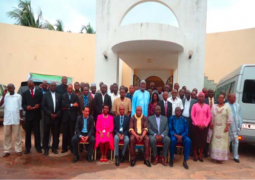The Chief of Defence Staff (CDS) of GAF, Lieutenant General Masaneh Kinteh on 16 August 2011 presided over the inauguration of
The seahorse network, according to officials, is a network of eight-member countries including
Speaking on the occasion, CDS Kinteh pointed out that the objective of the network is to enhance cooperation and coordination to fight illegal migration by boat between the countries of origin to the destinations.
This could be better achieved through an integrated coordinated system that would promote inter-regional cooperation between sub-Saharan Africa, North and Southern Europe to tackle not only illegal migration but also other illicit trafficking, he said, adding that seahorse network also enhances inter-agencies and other institutions engaged in the fight against illegal migration.
According to CDS Kinteh, the project, conceived since 2006, is supported by the European Commission within the framework to curb illegal migration and other illicit trafficking.
“Effective operation of this equipment requires skill and knowledge to ensure that they serve the purpose they are meant for, as a result 13 officers from the immigration department, Gambia Navy and Gambia Police Force were trained and certified on the smooth operation of the system,” he said.
He commended the Spanish government for its support and cooperation hope to expand from strength to strength in the interest of both countries.
For his part, Commodore Madani Senghore, commander of Gambia Navy, said that seahorse network is a satellite-based communication network capable of providing secure information exchange through voice and data transmission in multi-language interface.
He added that the system has a centralised database that is equipped with a documentary system for file-sharing, geographic information system, chat, email and voice over internet protocol telephony.
Eduardo Romero, head of Spanish missions, said The Gambia is one of the countries where the system works better.
He said both The Gambia and
Most of the victims of illegal migration are youths, and every country needs the contribution of its youth to national development, he says.
He added that for those illegal immigrants who succeeded in landing on the shores of
With this network the issues of illegal migration will be minimal, as these equipment have the ability to spot out even a small canoe in the sea within the range, Romero said.
Pa Baboucarr Mboob, deputy director of the Gambia Immigration Department, spoke at length on the importance of seahorse network.
Mr Mboob said that collectively with concerted efforts “we will be able to minimize illegal migration”.
“The issue of illegal migration is very difficult to manage but with this network and other strategies in place we will surely be able to minimize it,” he said, adding that illegal migration units have been established countrywide to ensure illegal migration is well tackled.
The ceremony ended with presentation of certificates to officers trained by Spanish officials on operatives’ tactics of the seahorse computers.
Read Other Articles In Article (Archive)
In Gambia Scout Association case, accused to be used as prosecution witness
Nov 25, 2015, 9:53 AM



